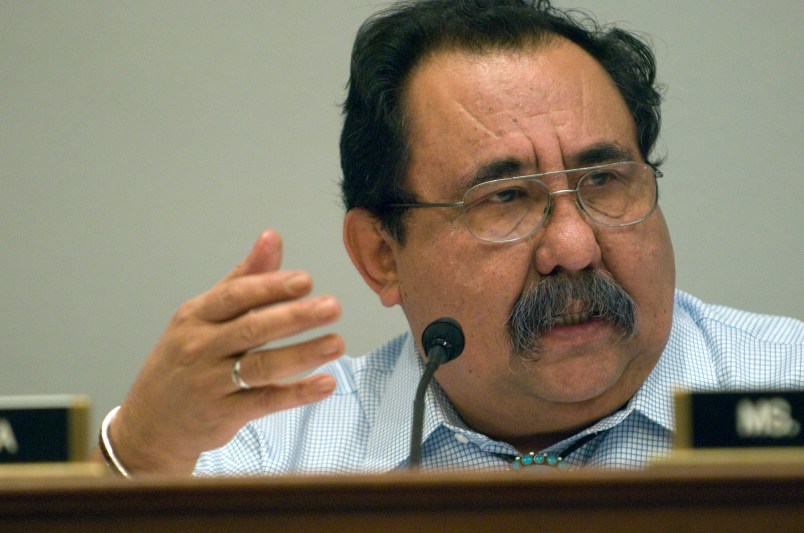In a statement released this afternoon, Rep. Raul Grijalva, co-chair of the Congressional Progressive Caucus, said he can’t support passing the Senate bill through the House.
“I cannot support the Senate bill for the same reasons I could not before,” he said. “It is a collection of unfair elements, including last-minute deal-making with certain individual senators in exchange for their votes, that has incensed voters across the country. It does not add up to an improvement in our health care system.”
But he offered a different plan:
I favor a two-part approach. Part one would be to pass a clean reconciliation bill requiring only 51 Senate votes that would include many important budget-related elements. This would not merely amend the Senate bill; it would pull the best budget-related items supported by the vast majority of American people from the existing reform bills and create a single transparent piece of legislation. Part two would be to send a separate handful of popular regulatory measures to the Senate, where they enjoy bipartisan support.
He claimed this could be done “without the need to re-engage a debate on how to ‘fix’ the irredeemable Senate bill in the face of unrelenting Republican obstructionism.”
Full statement after the jump.
“Millions of Americans are watching Congress very closely today to see how health care reform will proceed. The vast majority of House and Senate lawmakers agree that we need to increase health care access as much as possible, bring costs down and institute common-sense insurance industry reform. The question is how to go about doing that.
The Congressional Progressive Caucus and I are diligently working with our colleagues and House leadership to find the best way forward. We continue to seek meaningful regulatory reform and cost containment measures, as we promised the American people at the outset of this process. My objection to simply approving the Senate bill has upset many who believe the problems with the bill – which are too numerous to count – will be fixed through either the budget reconciliation process or a simultaneous bill amending the worst elements.
I believe that a fix of the required magnitude could not pass both chambers of Congress in a timely fashion. Instead, I favor a two-part approach. Part one would be to pass a clean reconciliation bill requiring only 51 Senate votes that would include many important budget-related elements. This would not merely amend the Senate bill; it would pull the best budget-related items supported by the vast majority of American people from the existing reform bills and create a single transparent piece of legislation. Part two would be to send a separate handful of popular regulatory measures to the Senate, where they enjoy bipartisan support. These would include insurance cost controls, portability between jobs, ending the use of preexisting conditions to deny coverage, prohibiting lifetime and annual limits on benefits, prohibiting age and gender discrimination, establishing essential benefit standards, and ending the practice of rescission. This approach ensures that much of what we sought to achieve with health care reform will be enacted without the need to re-engage a debate on how to ‘fix’ the irredeemable Senate bill in the face of unrelenting Republican obstructionism.
I cannot support the Senate bill for the same reasons I could not before. It is a collection of unfair elements, including last-minute deal-making with certain individual senators in exchange for their votes, that has incensed voters across the country. It does not add up to an improvement in our health care system. I regret that we have come to this point in the reform process, but now that we are here, we should follow a path that gives us the greatest chance to pass the laws we need and deserve and delivers affordable health care services to all Americans. Viewing the Senate bill as the simplest and least controversial vehicle for reform is a tempting but misguided trap. The bill forces people to buy insurance they could not afford. It places the burden on middle-income families it is supposed to protect. It does nothing to change insurance company behavior. In total, it is a recipe for disaster down the line. There are too many elements of this bill that make no sense for me to cast my vote in favor.
I remain committed to working with my colleagues to find the best path forward. As we do so, our first priority will be to achieve our long-standing goal of affordable, accessible health care for all consumers.”






